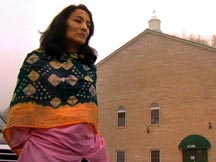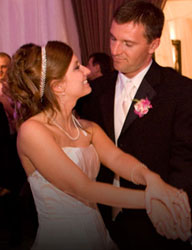 If you are at all active in the national American Muslim community, or if you have paid attention in the least bit to the myriad of issues Muslim-Americans have struggled with since the tragedy of 9/11, then you’ve heard of Asra Nomani–activist, Muslim feminist, the “bad girl of Islam” as dubbed by the media. Why is Nomani a hot topic, even today? When many Americans saw Islam as a religion of violence, when Muslim women were viewed through the lens of full-covered burkas as second-class citizens, when many Americans feared what was being preached in American mosques, Nomani sought to expose what she thought was wrong with how her religion was being practiced–and subsequently rocked the American Muslim community to its core.
If you are at all active in the national American Muslim community, or if you have paid attention in the least bit to the myriad of issues Muslim-Americans have struggled with since the tragedy of 9/11, then you’ve heard of Asra Nomani–activist, Muslim feminist, the “bad girl of Islam” as dubbed by the media. Why is Nomani a hot topic, even today? When many Americans saw Islam as a religion of violence, when Muslim women were viewed through the lens of full-covered burkas as second-class citizens, when many Americans feared what was being preached in American mosques, Nomani sought to expose what she thought was wrong with how her religion was being practiced–and subsequently rocked the American Muslim community to its core.
Nomani’s story is told in “The Mosque in Morgantown,” part of the “America at a Crossroads” series, airing tonight at 10 p.m. on PBS (check your local listings). The program details how she returned to her hometown from Pakistan, pregnant and alone, after dealing with the death of her Wall Street Journal colleague, Daniel Pearl in 2001. In shock, Nomani turned to her parents and her home to recoup.
But as she went to her mosque to gather strength, she felt exclusion. And so her fight started as a local one–to include women more in mosque activities, to enter in through the same door as men, and to pray side-by-side with them. But as time passed and people took sides, Nomani harnessed the power of the media to explore and expose hot-button issues for American Muslims.
Nomani has been and continues to be a divisive figure in the American Muslim community. I’ve known her since my college days, when she mentored me a little bit as I studied journalism at the University of Maryland and she worked in the Washington, D.C. bureau of the WSJ. And though I’ve always admired her tenacity, her drive, and her commitment to her cause, that cause itself and her methods haven’t always sat well with me.
Putting aside the question of if a woman should pray next to a man and if a woman can lead prayer, the larger issue put forth by the PBS program is how Muslims should pursue change in their mosques and communities: Through a complete rejection of conservative (or extremist, as Nomani sees it) Muslim leadership, or, as the moderates in Morgantown believed, trying to see some good in conservative Muslims and appeal to base decency to bring about change.
It’s an issue that remains vital to the growth of the American Muslim community today–do we completely reject any type of extremist speech because it can be, as Nomani says in the program, a slippery slope to terrorism. On face value, that makes perfect sense to do so. But, as moderates like Ihtishaam Qazi and Hazem Bata in the Morgantown community show, it is way more complicated than that. If nothing else, watch the program to see that unfold.
The PBS program on Nomani is a fair attempt to explore this question. But too many things are left untold for me: How does Christine Arja, a Muslim convert who initially opposed Nomani become her only ally? Why can’t Nomani and moderates like Qazi and Bata come to terms when they seem to want some of the same things for their mosque? Because if they can’t build bridges, then what hope is there for the larger tasks at hand?


